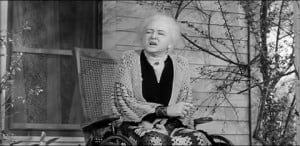Choose a supporting character from TKAM (not Scout). What impact has that character had on the story so far? What appeals to you about that character? What repels or disgusts you about that character? What else do you want to know or expect from that character?
Include one quotation to support your discussion, and post the content on your blog!
—

Mrs. Dubose is an interesting and difficult character for me. The first time I taught this novel, I was actually caught very off-guard by her: I knew this novel was about the Scottsboro trials, and injustice, but all of the small-town stories of Part I didn’t match up with those expectations. (I was reading the novel alongside my classes for the first time that year, too, which made for a lot of fun, but also a lot of learning for me.) This angry, strange, morphine-addicted old lady popped out of nowhere in my reading, and for a long time, I have had no idea what to do with her.
The more time I spend with Mrs. Dubose, though, the better I think I understand her. She does give readers some early introduction to Atticus’ defense of Tom Robinson, and shows us how most of the established public would have responded to did respond to the Scottsboro case. I think one interpretation of her is that she symbolizes the “old South” and the attitudes that are passing away; Mrs. Dubose is complicated, though, and I think she has more than one side to her personality.
A lot of her personality repels me, and I think she’s meant to–she’s rude, insulting, and just plain mean. Associating her with racial slurs and racist attitudes shows that those attitudes should also be repellent. I get that. What complicates her are the ways Atticus talks about her after she is dead: “I wanted you to see what real courage is, instead of getting the idea that courage is a man with a gun in his hand. It’s when you know you’re licked before you begin anyway and you see it through no matter what. You rarely win, but sometimes you do” (Lee 149). Atticus is talking about her addiction, rather than her attitudes, and praising her for having the courage to fight through the difficult battle to end her habit.
Sharing these different sides of Mrs. Dubose may be there to show us that people, like characters in a novel, are complicated. They can be both admirable and despicable–it depends which side they are showing that day. Even after writing about her, I’m not sure I like her–even still, I’ll be thinking about Mrs. Dubose long after the end of our novel.
Be First to Comment